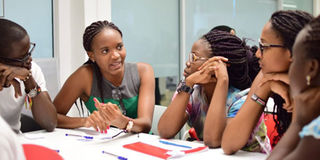Mentorship helping new students to adopt

Work. A mentor helps guide an individual especially when making life-changing career decisions
What you need to know:
At most of our universities this month, there is a boom of first year students. But being a new student in an environment bigger than the school one they were used to, comes with challenges such as failing to find their way around the place. This is the reason mentorship programmes are thriving at these institutions.
My experience as a first-year student was not a good one. First of all, I did not attend orientation - like many of my fellow students as I later learned. So, settling in was difficult. I did not have a timetable, neither did I know where to find one. The place where our department offices are – was not where our lectures took place like I assumed,” Judith Ajok, a third year Journalism and Communication student at Makerere University, recalls.
It is time for first years to report to campus for many universities and often, they encounter such challenges.
Ajok, for example, recalls a time during the first semester examinations when she had no idea where some of the examination venues were, despite months of being at the university. “I remember reaching almost an hour late for my Introduction to Journalism exam after a student had directed me to a totally wrong venue,” she says.
Like her, one of us has at least found themselves in such situations. Though student orientations are helpful in initiating new students into the new university environment, the Counselling and Guidance unit at Kyambogo University believes there is more orientation and mentorship needed during orientation week – hence the Kyambogo University mentorship programme.
Sharing her experience with the programme which was introduced at the university last year, Lindah Kyatuhaire, a second-year Accounting and Micro Finance student at the university, says she learnt about the programme during orientation week in her first year.
“I randomly came into contact with a mentor who asked me about how I was finding university life. We talked a bit and kept in touch. I did not know where to stay, where to go, lecture rooms kept on changing and I did not know where they were, so the mentor would help me with all that,” Kyatuhaire recollects.
Study the environment
The mentorship was basically designed to help new students like her to learn and discover more about their new environment.
“Even though I attended the orientation, I still found difficulty in locating some of the areas on campus. I should say I was able to settle in early, easily and well because I had a mentor,” she believes.
Kyatuhaire further shares that what interested her most was discovering that the mentors were fellow students who dedicated their time to helping others.
“And because I know what it means to be a first-year student with no help, that is why I also signed up to become a mentor to help others settle and catch up with the university community,” she says.
On ground, the programme begins with a student who has been trained in mentorship. This must be a continuing student at the university who has been recommended for good behaviour and academic performance by their faculty. During training, they are equipped with skills to mentor, be a friend, a role model and supporter in the academic and personal growth of a mentee and this is done throughout the first academic year on voluntary basis.
The week in which first year students report, a mentor identifies some year one students who need guidance, direction and information and starts mentoring them for the rest of the year.
James Ndyabahika, a third year Microfinance student at Kyambogo University, notes that while training as mentors, they are given leadership and communication skills to help them to easily connect with new students. “As individuals, when we find challenges with mentees that we cannot solve. We share with our supervisors because there is a common ground between us,” he says.
Day-to-day work
Basically, a mentor’s day includes guiding new students to various locations, rescuing them from people with bad intentions such as conmen and cautioning them on dangerous spots on campus, among others.
“We, for example, got a case of a girl who was conned when she went to get a reference number. Instead of being helped, the person instead used her money to pay for his own reference number and we are handling that by tracking down the person,” Stephen Kambuka, a second year Civil and Building Engineering student at Kyambogo University, says.
For easy identification, mentors wear T-shirts written on mentor and a tag. At the same time, new students are given brochures during orientation in addition to announcing availability of the mentorship services.
Following up
Kyatuhaire mentions that although all first-year students who need immediate help are served, those who take interest in being mentored are registered and continue on the programme for the rest of the year. “We remain with one another’s contacts. We keep in touch on WhatsApp groups but also ensure we physically meet with them every after a fortnight, though this can be more, according to one’s needs,” she says.
The academic impact
Though the mentorship is primarily to help students settle into the university environment with little difficulty, this, they believe translates into better academics.
Alfred Drasiku, a second-year Environmental Science, Technology and Management student and mentor, notes that a student who is fully settled into the university environment is able to concentrate in class. “We are here to always remind them about their purpose of coming to university. We follow up their academic progress to ensure they excel,” he says.
VITAL VOICE
Hierarchically, every mentor is to have 15-20 mentees under their care, whose details they take to a supervisor - who is a staff member in a department that works closely with students who have also been trained. The supervisor then, having done an activity plan with the mentor for the rest of the year, they report their mentees to the mentorship committee which reports to the dean of students.
The mentors track the progress of the mentees. For example in the second week, they are supposed to find out whether they have actually found their lecture rooms and they are attending lectures. In the third-fourth week, they are supposed to find out from them whether they have paid money in the bank, registered, and generally settled.
Later on, they are supposed to find out whether they are comfortable with their lectures, the library, they have got course works and tests and whether they are doing them, plus any other psycho-social or environmental challenges. What we aim to achieve is; a better image of the university, to reach out to the community before us, get better performance, reduce retake levels, drop out levels, change the behavioral trends of young people, but also intervene in every way in the life of a youth at risk.
Jean Nuwagaba, senior counsellor and chairperson, mentorship programme committee, Kyambogo University
IMPACT
The idea was conceived in 2015. But as a department of counseling and guidance, we decided to implement the program in 2017 on a voluntary basis because the university didn’t have the funds to support the programme. We sold the idea to the students and they liked it so last year, we reached out to 135 students whom we trained as mentors and each allocated 10 mentees. We were thus able to reach 1,350 students. This year, we have slightly more mentors 165, who are more zealous. Each will have about 15-20 mentees and we hope to reach out to 5,000 out of about 15,000 students the university enrolled. We believe in a multiplier effect that the students we reach out to will also influence others.




